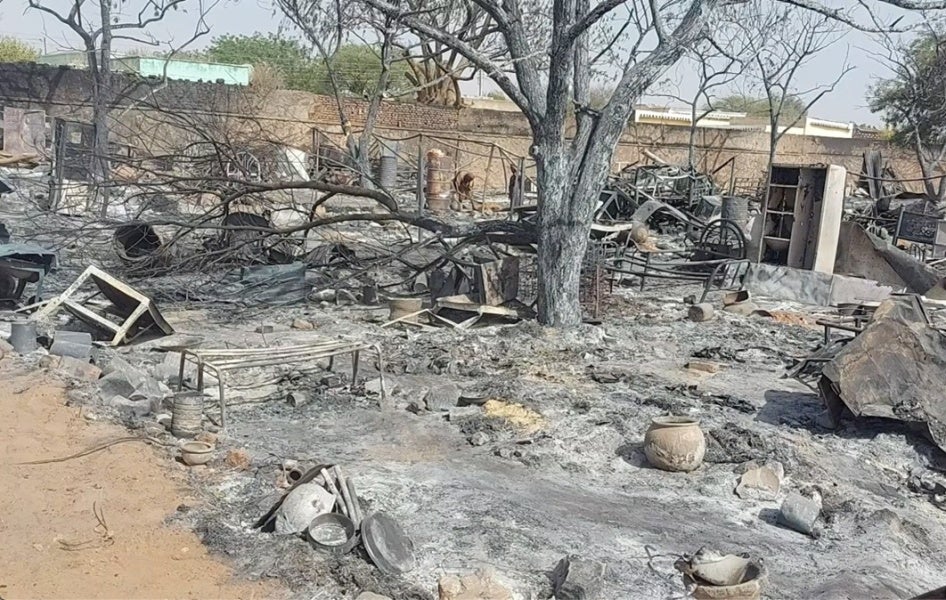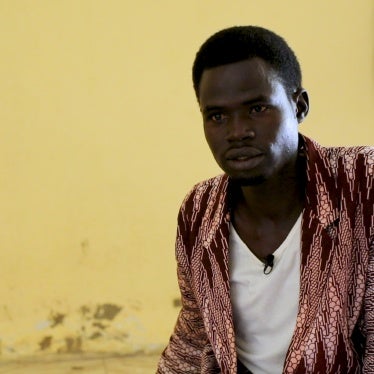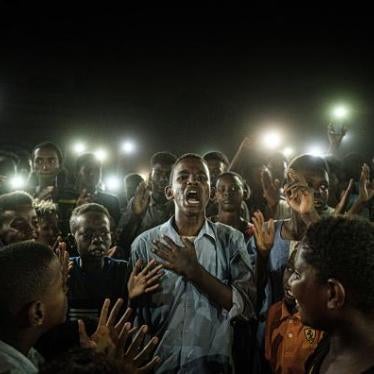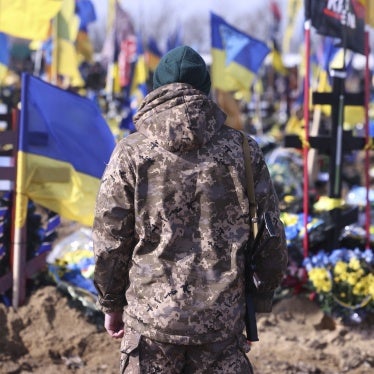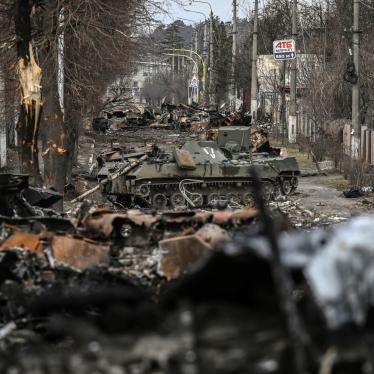Jamal Abdullah Khamis, Human Rights Lawyer from El Geneina
Of everything that happened what disturbed me most was what happened at the Mohamed Adam Clinic.
When I walked in, I found my friend Mudather in the southeast corner of the clinic.
It was as if he was sleeping.
He didn’t look like he was dead.
He looked completely normal.
But in fact, he was dead.
When I arrived, they told me that he’d been shot in the back by a bullet.
They told me he was shot with a DShK gun because the bullet was big.
It went in, and it didn’t come out.
Narration by Mohamed Osman, researcher, Human Rights Watch
On April 15, 2023, war breaks out in Sudan.
It marks an escalation of the power struggle between two military leaders who have vied for power since they jointly overthrew a power-sharing government in October 2021.
The war pits the military against an autonomous force known as the Rapid Support Forces, or RSF.
By April 24, 2023, the conflict spreads to El Geneina, the capital of West Darfur.
The atrocities that follow are documented by Jamal and other local human rights activists with the aim of bringing those responsible to justice.
Jamal Abdullah Khamis, Human Rights Lawyer from El Geneina
I was at al-Sadaqa Clinic on April 24, from the first day of the events, with a group of my colleagues from our organization.
We were working in the clinic.
Our role was documenting violations against the injured and the dead.
Everyone who was brought to the clinic we would document.
The number, their names, (ethnic) backgrounds and information.
We were documenting all of these things.
Narration by Mohamed Osman, researcher, Human Rights Watch
Jamal and his colleagues notice a pattern to the killings.
The RSF and allied Arab militias were targeting doctors, lawyers and human rights activists.
Majority-Massalit neighborhoods and camps for internally displaced people were also being systematically targeted.
The violence feels all too familiar to Jamal and others in West Darfur state, who recall fleeing their home villages in the early 2000s after being attacked by the Janjaweed, the predecessor of the RSF.
Thousands were displaced, including many Massalit people.
They found refuge in the camps for internally displaced people that swelled the outskirts of El Geneina.
The conflict then occurred against a backdrop of long-standing tensions over land and other resources between non-Arab farmers, such as the Massalit, and nomadic Arab communities who were starting to settle.
On June 15th, 2023, RSF and Arab militias overwhelm the remaining Massalit-majority neighborhoods.
Tens of thousands of Massalit and other non-Arabs try to flee central El Geneina for its northern suburb of Ardamata, where there’s a Sudanese Armed Forces base.
The RSF and militias attack the convoy, injuring and killing men, women, and children.
Jamal Abdullah Khamis, Human Rights Lawyer from El Geneina
I was accompanying my (injured) friend, Yousef Haroun Kabello.
Minutes later around eight militiamen appeared wearing RSF uniforms.
There were others with them from these well-known Arab militias.
They were arguing with people.
They stopped the cars.
They opened fire on us.
They shot at the chests of children, women, old and young men.
It was a harrowing scene.
We thought about how to escape.
But we needed a way to escape.
How were we going to escape?
They started chasing people down the valley and firing on people who were in the water.
It was terrifying.
We couldn’t go back or move forward.
We hid in some grass and bushes on the edge of the valley.
That was at dawn on (June) 15th before sunrise.
Then a chance came to run back.
In al-Majliss neighborhood we experienced something terrifying.
When we were going down the street we saw bodies everywhere, of women and children.
They were the bodies of people we knew personally.
But you can’t stop and help someone who is dead in the street.
We kept running because we were being chased.
TEXT: The killings continue for several days in El Geneina and on the road to Chad, where tens of thousands of civilians, including Jamal, flee in search of refuge.
Jamal Abdullah Khamis, Human Rights Lawyer from El Geneina
I found someone I knew and said, “Let my friend Kabello ride with you, he’s injured. It’s not a problem, I’ll walk behind with everyone else.”
He said, “My car is full, but he can get in.”
After a while we were attacked.
Bullets started showering us from all directions and people were being killed.
A child of around nine years old, came to me crying hysterically and was holding on to me.
While we were walking, we came to a big trench.
But the militiamen probably saw us going in there, because they were nearby.
They forced us out and started beating us, torturing us, and firing just over our heads.
They were arguing about whether to kill us or not.
Those who had belongings, they took them.
I had my two mobile phones, a USB stick, and some cash.
The nine-year-old child was lying down by my side.
The beating and torturing intensified, they were using a metal rod, some sticks, and whips to beat us.
We were lying on our stomachs, and he stood up.
The young boy couldn’t handle it anymore.
They shot him in the head, and his head exploded.
He died immediately.
A second group also started beating and interrogating us.
They asked what tribes we were from.
If you answered that you are Massalit, they would kill you immediately.
I denied that I am Massalit even though I am Massalit.
They pressured me, and I told them I am from the Bargo tribe.
They brought someone to talk to me in the Bargo language and I replied because I know how to speak it.
He said, “Brother, go.”
We entered Chad.
We were shocked to see Chadian officials in front of us.
Chadian military uniforms are very similar to RSF uniforms.
They were also carrying whips.
They all had a whip and a gun.
The RSF have the same.
When our group ran towards them (the troops) they told us to stop running.
We were surprised, and thought it was the RSF again.
We ran back towards Adikong (in Sudan).
The soldiers ran after us and said, “We are Chadian officials.”
We weren’t convinced until we saw the Chadian flag on their uniform.
“We’re Chadian officials. This is Chad, you are safe.”
“Many of your people arrived here before you. Welcome.”
I was very tired, and they took me to the hospital.
When I was in the hospital, who did I find?
The man who was with me.
My friend Kabello that I helped into the car.
He made it, and they took him to the hospital.
That was our horrific journey.
Despite the huge shock and gruesome massacres that happened in West Darfur, I still have a lot of hope.
Life in refugee camps and abroad is very tough.
It’s no place to live.
I have hope that El Geneina will recover, and we will go back soon.
That depends on rebuilding the justice system.
We need justice to be carried out.
We need the principles of human rights and international law.
That speak of the dignity of human life and the dignity of people.
If these are embodied in West Darfur, then there is hope that we can return to El Geneina.
The international community should deploy a mission to protect civilians in Sudan.
TEXT: The international community should also impose sanctions against those responsible for atrocities and establish an arms embargo on Sudan.
